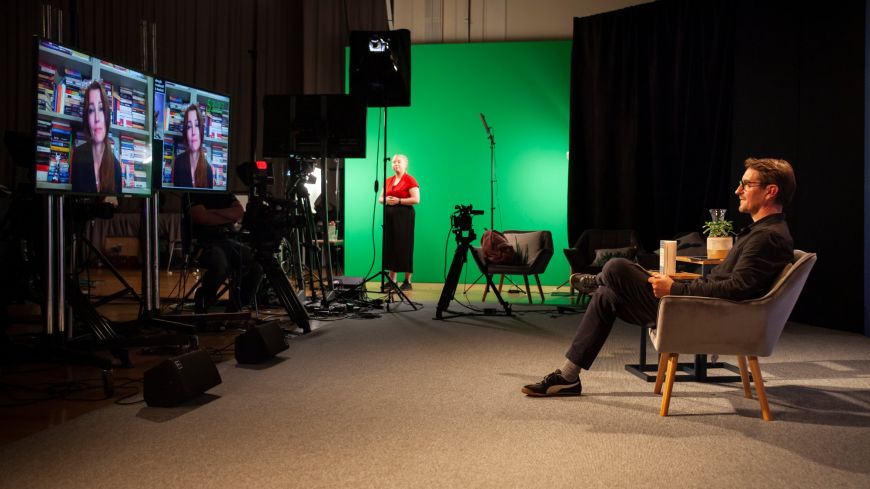
It was coming. Just nobody expected it to happen so fast. As the internet upended the traditional business models for the music industry, newspapers, television, shopping and so many aspects of our lifestyles - Edinburgh’s Festivals watched from a safe distance and dabbled quietly around the edges.
A festival trailer or promo video here and there, maybe a puff of social media action to whet audiences’ appetites. Digital box offices. The EIF's spectacular opening night events, like Deep Time and Bloom. However, as a whole, the festivals’ output online seemed to be primarily about promoting and pushing the live, in-person programme.
The pandemic has changed that. As Covid roared through the performance arts world like wildfire through drought-ridden forest, the arts industry has had to retool and reinvent itself to survive.
Stung by the enforced cancellations of the Edinburgh festivals last year, Edinburgh’s Festivals are presenting an online offering that is more the destination for audiences, rather than just a signpost on the way to the destination.
Just last month, the Edinburgh Jazz and Blues Festival streamed 20 broadcast-quality gigs, performed live to socially distant audiences at Assembly Roxy. A Festival Pass to all the online concerts (plus an additional 20 pre-recorded shows) was a good-value £40, with concerts available on-demand 72 hours after they went live.
In a first, this year’s Edinburgh International Festival is releasing a series of 18 free, on-demand recordings of performances from this year’s festival.
The Fringe online is chaotic and incohesive, which partially reflects the spirit of untamed experimentation of its parent body, but also begs questions about how, going forward, it will define its purpose and identity in the virtual world.
Shows under the Fringe online banner run from live theatre from Adelaide Australia, to a Zoom show, Avatar Me, where you take control of a random stranger on the other side of the world; from free Royal Mile walking tours to a rocking gorilla livestream.
Edinburgh Book Festival
The Edinburgh International Book Festival - which opened today and runs until 30th August - was perhaps always best positioned to benefit from a transition to the hybrid paradigm that each of the festivals have grasped in their own way.
The traditional EIBF show format, when it was in Charlotte Square Garden, was typically two or three people up on a stage having a conversation. The format is simple and lends itself easily to the online medium.
This has allowed the EIBF to push more into the digital realm than other festivals, uploading recordings of author talks, each year for the past decade, to its YouTube channel - Alasdair Grey, AL Kennedy, Arundhati Roy, Irvine Welsh, to name a few. No doubt, thorny copyright concerns have also been a factor in how much content other festivals can carry online.
To be clear, there’s nothing like being at the festival and event in person, hanging on the author’s words along with a live audience, without the various distractions when you’re at home. But at a time when daily interaction and shared experiences over the internet have become commonplace, untapped opportunities for the festivals abound online.
EIBF director Nick Barley called the impact of Covid19 “a huge tectonic shift” in the way that live events can reach their audience.
Last year, between the cancellation of Edinburgh’s Festivals on 1 April, and the beginning of August, the 2020 Edinburgh Book Festival managed to scrabble together its first fully digital programme, with 146 online events ranging from daily draw-alongs to conversations with authors.
Building on that experience this year, with the lingering threat of Covid, came the conviction that the EIBF’s future is more digital, hybrid.
The new EIBF is more steeped in tech than it’s ever been. In its new home at Edinburgh College of Art, on the south side of the city, there are two in-person venues with a socially distant capacity of 60 and 100.
“They’re essentially TV studios,” says Barley, each room with six cameras - 3 live camera operators, and 3 remote, operated by a live-editing team.
Some authors will be on stage in person, while those guests appearing over the net will be displayed on a large, 10-metre-wide by four-metre-high screen at the back of the stage.
Outside, in front of the building, an overflow audience can enjoy select shows on a huge screen. The EIBF has recreated the ‘village green’ atmosphere of Charlotte Square in the ECA courtyard, with a bookshop, café, family play area, and bar.
Barley says, “digital events will continue to be a key part of future Book Festivals, enabling us to reach truly global audiences as well as those closer to home who face barriers to attending the event.”
He - like other festival organisers - is also looking at ways the EIBF can reduce its carbon footprint. A polished digital operation will allow the EIBF to continue to have guests visit on a screen rather than by fossil-fuelled flight from some far-flung location.
Barley is the first to admit there will be mistakes. Much of it will probably be of a technical nature. On the message boards before the start of one online show today, with kids’ author Julia Donaldson (now available on-demand), audience questions about how to stream through a television mingled with comments anticipating the coming talk.
Barley is hopeful that online festival-goers will be forgiving in what he calls this “transition” period for the festival.
Out of the parched earth of the pandemic, the green shoots are springing, and a virtual programme that will only grow in stature.
The Edinburgh International Book Festival runs from today til end of August. Booking and information.

